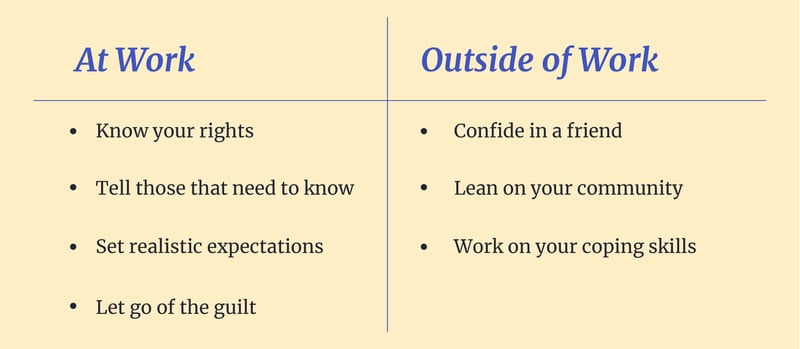Certain life events can make getting out of bed feel impossible, and leave even the most career-focused person completely disengaged from their job. Being human means experiencing big reactions to things outside of your control, and sometimes the mental and emotional energy it takes to cope with and manage those feelings comes at the expense of the brainpower or attention that you need to do your job.

There is no shortage of life circumstances that can directly affect a person’s engagement and performance at work. Some common examples include going through a divorce, grieving the loss of someone significant in your life, coping with a medical diagnosis for yourself or a loved one and returning to work from maternity leave while battling postpartum depression. Then, of course, there are more unique situations - like living, working and virtually teaching through a global pandemic - that can take up just as much emotional energy.
Even in the best of times, the line between work and personal life can tend to blur occasionally, so when you’re going through something personally devastating and/or all-encompassing, trying to leave your home life at home is simply unrealistic. As nice as it would be, you, unfortunately, can’t just press pause on your emotions while you’re clocked in for work.
On the flip side, however, you also can’t just press pause on your job while you’re going through hardship. You have to figure out a way to simultaneously cope personally and stay engaged professionally. It’s not an easy situation by any means, but with the right support and knowledge, it is possible. Here are some tips for getting through it.
Be honest & professional at work
A good employer will be understanding and as accommodating as possible as you work through personal hardship, but they need to be aware of what’s going on in order to support you. In order to navigate this crisis professionally, you will need to keep an open, honest line of communication.

Know your rights and familiarize yourself with company benefits and policies
If you have been diagnosed with a major illness, are suffering from depression or anxiety as a result of your situation or are suddenly tasked with caring for a sick loved one, you may qualify for FMLA, reasonable accommodations and/or other legal protections to help you during this time. Even if your situation isn’t covered by FMLA, take a deep dive into your company’s HR policy manual to see if there are any benefits you’re unaware of. A lot of employers offer a certain amount of extended time off (paid or unpaid) or flex schedules for employees who need it.
Outside of formal policies and procedures, your company may also provide employees resources such as an Employee Assistance Program (EAP) or free access to a well-being platform. This is the perfect time to take advantage of these perks - this is exactly what they’re there for!
Tell the people who need to know
From the outside, your sudden disengagement at work could be interpreted in a lot of different ways. If you’re going through something so difficult that it is negatively affecting your performance at work, you want to control the narrative, otherwise, people will fill in the blanks based on their own assumptions. This means you’ll need to intentionally share what’s going on with a handful of people.
This can, understandably, be an uncomfortable conversation. You may be sharing personal details of your life with your supervisor, someone in HR (who could be a total stranger to you) and potentially some of your peers. Still, as much as you’d rather avoid it, sharing this information with the people who need to know will likely benefit you as you continue to work through your situation.
During the conversation, be honest about what’s going on and as transparent as possible. If there are certain details you don’t want to share, though, don’t feel obligated to include them in your narrative. If you left out any essential information they need for approval or records, your boss or HR representative will let you know directly what exactly they need so you don’t have to divulge any more than is necessary.
As your situation evolves, you’ll want to keep these people updated. Letting them know what’s going on will help them manage their expectations of you, give them the opportunity to shuffle work around if necessary and generally let them know how you’re doing (because chances are good they really do care about your well-being).
Set realistic expectations
When you meet with your boss to discuss your needs, be honest with yourself and your boss about how much work you will realistically be able to accomplish. This is a time to underpromise and overdeliver, not to be a hero. By being up front with your supervisor about how much you’re able to take on, it allows them time to look over your workload and redistribute your responsibilities to your teammates mindfully rather than having to scramble at the last minute because you agreed to do more than you could handle. It may feel like you’re letting people down by taking a step back like this, but in doing so you’re actually showing them a lot of respect because you’re thinking ahead so no one will be left in the lurch.
Let go of the guilt
Once you’ve told everyone you need to tell, gone through the formalities and provided all the documentation needed to professionally manage the situation, let out a giant sigh of relief. It can be really difficult to intentionally show your vulnerable side and ask for help at work, so don’t brush it off as a negative.
Moving forward, try to let go of any guilt you may feel when you need to take a mental health day or you have to sign off early for an appointment with your counselor. Let the open line of communication serve as an assurance that you will be contacted if there are any issues with your performance or schedule. You may even find that your personal hardship is a little less daunting without the added layer of work stress.
Manage the situation outside of work
The only way you’re going to get to the other side of this professionally is by facing the problem head-on outside of work. It can be tempting to try to use your job as a distraction during difficult times, but you don’t want to delay inevitably addressing your feelings to find a way to move forward personally.
Talk to someone you feel comfortable with
Major life events often use up a lot of mental space because you are tasked with feeling, identifying and managing a wide range of emotions that are happening simultaneously. For instance, if you’re going through postpartum depression, on the surface it would seem like the thing you need to work through is sadness, when in reality you could also be feeling rage, guilt, grief, resentment, fear and disappointment as well. It’s a lot to process and it’s helpful to have someone to talk to while you go through it.
Seeing a therapist or professional counselor to get through a difficult period in life is a fantastic idea, but if you’re not comfortable with that, or not able to do so, you’re not out of luck. You just need someone you can trust, who will actively listen to you and who will give feedback, advice or even a hug when you ask for it.
Lean on your community
During an emotional upheaval, your instinct may be to isolate and hide away until you’re on the other side of it - but don’t. Lean on the people in your life who love and support you, and who will encourage you as you navigate the situation. This can include your family, best friends or a group of virtual friends you found in an online support community. Let these people be there for you, because chances are good they want to, and can, make this process a little easier on you.
Develop healthy coping skills
As you work through your feelings, develop healthy coping mechanisms that you can practice inside and outside of work, like deep breathing exercises or short mindfulness exercises. Use these skills when you’re struggling with things that are out of your control, feeling extremely stressed out or can’t seem to focus on the task at hand.
Don’t rush the process
It’s safe to assume that no one wants you to get to the other side of this hardship more than you, but don’t feel like you need to rush to get there. Getting to a point where you feel engaged professionally again is incredible progress, but there might still be some work you need to do personally. Allow yourself as much time as you need to fully heal from this life event so that when another emotional upheaval comes along (and it will) you’ll know what you need to do to make it through.
Support throughout your career journey
No matter what stage you are at in your career, The Mom Project is here to support you with resources. 



